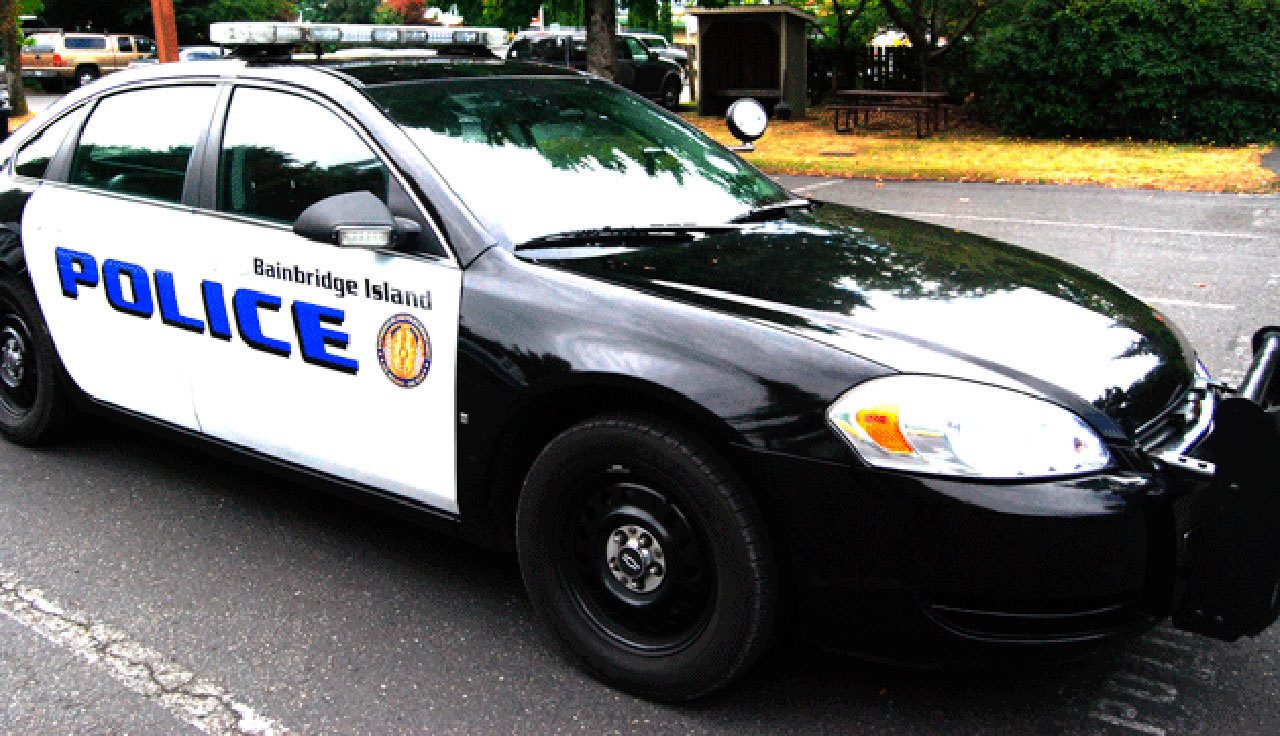Editor’s note: ‘Dispatches from the Academy’ is an ongoing series relating Review reporter Luciano Marano’s experiences as a member of the latest Bainbridge Island Police Department’s Citizen’s Police Academy class. Anyone can apply to attend the periodic program, which gives participants a hands-on look at the function and duties of the BIPD and other local, related agencies. Call 206-842-5211 or email policedept@bainbridgewa.gov for more info about the next academy.
There are more guns being toted around on little ol’ Bainbridge Island than one might imagine.
It’s practically the Wild West over here, except with way more Birkenstocks and organic wool cardigans.
Week Two of the Bainbridge Island Police Department’s Citizen’s Police Academy was a double whammy: “Office Procedure” and “Narcotics” were on tap, as presented by Senior Police Clerk Leslie Hetzler and Detective Sgt. Scott Weiss, respectively.
Now, you’d think that “Office Procedure” would have nothing on “Narcotics” in the field of excitement, but it was actually Hetzler who claimed the “bombshell of the night” award when she dropped this tidbit on the class:
Question: How many concealed weapon permits do you think the Bainbridge Island Police Department processes every month?
Answer: About 25.
That shocked so many of my fellow academy attendees that we literally could not move on (try as Hetzler might). With every other question, it seemed somebody else would say, “Yeah, about the concealed permits again — sorry, 25 you say? On Bainbridge? Really?”
Yes, really.
It also came as quite a shock to several of the newly relocated participants (even one guy from Texas) that Washington requires no formal training before purchasing a gun, just a background check. Hetzler said they saw a marked increase in permit applications around the election, too, an almost while-you-still-can type of frenzy.
Sorry, folks. False alarm there, it seems.
The department’s front office also handles evidence storage, lost property submissions, pet and home alarm system registration, records retention and public records requests. That last one’s a big deal: There are about 58 public records requests that involve police reports every month here, Hetzler said.
Office staff also fingerprint citizens for a variety of reasons, she explained. By the way, hardest finger to print? The pinky.
All sorts of randomness walks through the door, too. Hetzler said the office staff field queer questions over the phone and from walk-ins all the time in their role as faces of the department, about things as disparate as driving directions, parking assistance (don’t try to park in the police lot, sports fans; they will catch you), and the ferry schedule.
On the “Narcotics” side, the pinnacle problems are what you’d think: prescription drugs (which accounts for about 43 percent of all felony drug crimes on BI) for the adults, and marijuana and alcohol for the juvenile crowd.
Most police interaction with that second group, Weiss said, comes during house parties where — usually, but not always — the parents are not around.
Indeed, the love of the wacky weed is so blatant among island teens, Weiss said he’d personally passed a group of them toking up at the ferry terminal just a few days before when returning from Seattle with his wife (that’s illegal no matter how old you are, by the way).
The detective did praise Bainbridge’s own cannabis dispensary, Paper & Leaf, though, saying the island shop was fanatical about security and adherence to legal protocols. He even likes the decor. It seems that though the island didn’t make it easy for such a place to get up and running, what with all the location restrictions (not near a school, church, park, etc. — and where on Bainbridge isn’t near a school, church or park, really?), Paper & Leaf is exactly the kind of shop voters were hoping for when they cast votes for “yes” by a fat margin.
The No. 2 drug of choice for BI adults used to be methamphetamine (29 percent of all island drug cases), Weiss said, but heroin has seen such a spike in popularity in the region recently that it now may be too close to call.
Cocaine trails in third place, accounting for about 8 percent of the department’s drug cases.
Fun fact: Prior to legalization in Washington state, marijuana accounted for nearly 60 percent of drug cases here.
In the grand scheme of things, though, booze still bests all.
Crimes involving alcohol, perhaps predictably, “far exceed,” Weiss explained, “that of illicit drugs on the island.”
In the past nine years, BIPD have investigated an awesome array of alcohol-related incidents: DUIs (adult) — more than 600 cases; DUIs (minors) — more than 30 cases; minors possessing alcohol — about 200 cases; minors exhibiting the effects of alcohol in public — about 100 cases.
Though it is legal in Washington for parents to allow their own children (but not their kids’ friends) to drink on private, non alcohol-selling property, Weiss said, it’s not exactly encouraged and, contrary to what many seem to believe, that allowance does not extend to marijuana — even now, after the legalization effort.
The police here, it seems, endeavor to walk a line between giving us what we want and what we need when it comes to enforcing the rules.
Parents, I’d think, can relate.
Read Part I — “BI’s top cop talks shop with aspiring citizen grads” here: www.bainbridgereview.com/news/dispatches-from-the-academy-part-i-bis-top-cop-talks-shop-with-aspiring-citizen-grads/



